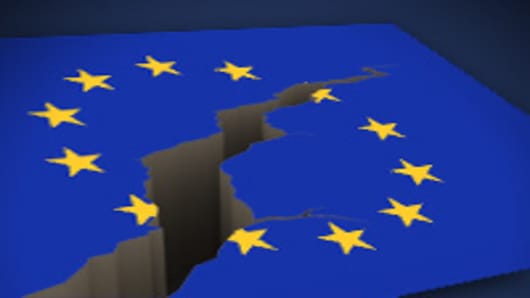For most of the summer, markets seemed to pick a different European country as their focus of their angst almost every day.
The markets have gathered the most heavily indebted euro zone members - Portugal, Ireland, Italy, Greece and Spain – under the acronym PIIGS.
Portugal and Ireland, both previous holders of the "next to fail" badge in the euro zone, have slipped quietly from center stage.
"We are seeing positive signs in these countries," Valentijn van Nieuwenhuijzen, Head of Strategy, ING Investment Management, told CNBC Friday. "One of the things to really make clear to the markets is that Greece is different to the other peripheral countries, let alone the rest of the euro zone."
"These countries can behave differently and have a different response to the crisis that is unfolding," he added.
While stock markets have plummeted elsewhere in the euro zone, Portugal's and Ireland's, which had already suffered blows, have actually held up relatively well this year.
Since May 20, when the Portuguese aid package from the International Monetary Fund (IMF) and European Financial Stability Facility (EFSF) was approved, both Ireland's and Portugal's main stock markets are down by around 20 percent. Italy's is down 37 percent after a huge run on Italian banks, and the broader Eurostoxx index is down by 31 percent.
The bonds market, which has driven up yields on Italian bonds recently, seems to be looking more favorably on Ireland. Yields on its benchmark 10-year paper are down from over 14 percent in mid-July to around 8.6 percent Friday.
They need to fall to around 5-6 percent if Ireland is to exit its bailout program in 2013 as planned.
While Portugal has not had quite the same success, yields on its 10-year bonds are down from 13.5 to around 11 percent.
Bond markets suggest that developments in Ireland could be said to be "one of the few positives over the past few months among the euro-area peripheral sovereigns," analysts at Deutsche Bank wrote in a note.
"On the fiscal front, Ireland has performed better than the targets set under the economic adjustment program while Portugal remains more or less on track," they wrote.
Investment Grade Status
Rating agencies Standard & Poor's and Fitch rate Portugal BBB-, on the edge of investment grade, while Ireland is three notches clear at BBB+. Moody’s has already downgraded both countries to below investment grade status.
The Irish government is going to great lengths to protect its low corporate tax rate, seen as key to maintaining its relatively resilient exports.
It emerged on Thursday that the Irish ambassador to the EU has written to the EU Presidency asking to preserve the country's jurisdiction over taxation as part of the forthcoming Croatian accession treaty.
Lucinda Creighton, Ireland’s European affairs minister, told reporters: “Ireland’s 12.5 percent corporate tax rate has been a cornerstone of our industrial policy, is an integral part of our international brand, and is critical to supporting our economic recovery and employment growth.”
The 24 billion euros ($33 billion) of recapitalization funds needed to restore the country's stricken banking sector, dragged down by the collapse in its property market, are less than the 35 billion euros earmarked in its aid program.
More than 72 billion of the most risky real estate loans have been transferred to the NAMA to clean up banks’ balance sheets.
One key differentiator between the two countries is their export strength.
Ireland's partial recovery has been helped by strong exports, particularly in the pharmaceuticals space, but private consumption has fallen as a harsh austerity program affects the populace.
Domestic demand in Portugal has fallen relatively slowly, and now accounts for close to 70 percent of GDP, in contrast to Ireland, where it accounts for less than half of GDP.
"This limited decline in consumption expenditure in Portugal leaves the Portuguese economy particularly vulnerable to fiscal retrenchment as well as private sector deleveraging," according to the Deutsche Bank analysts.
On the flip side, Ireland's reliance on exports means it is more vulnerable to downturns in the rest of the world.



